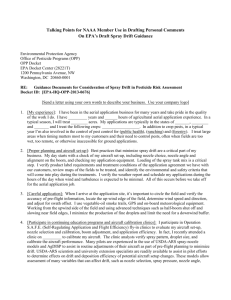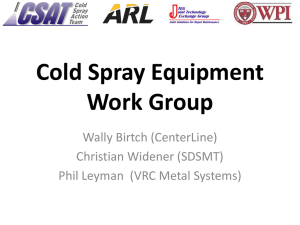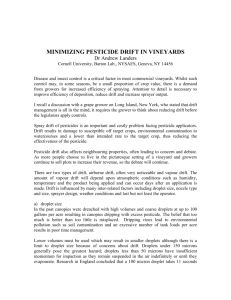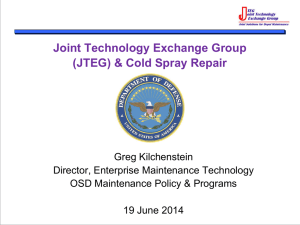Kansas Turfgrass Conference - Biological and Agricultural
advertisement
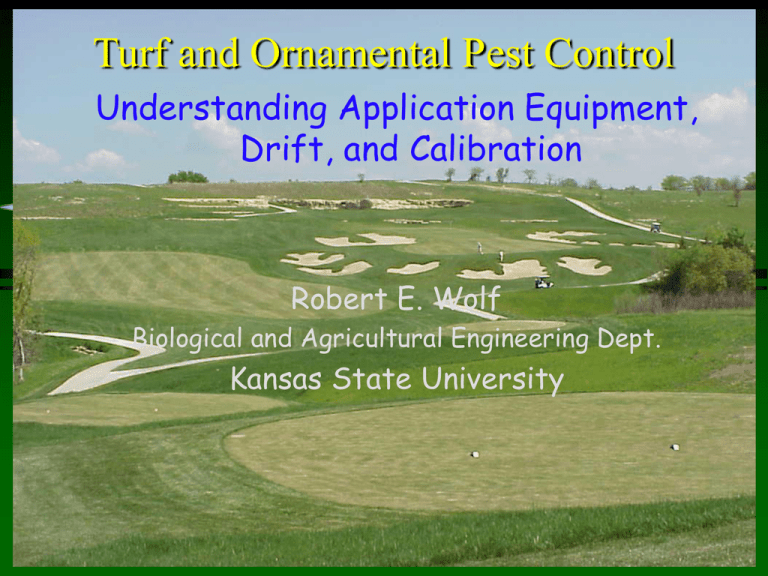
Turf and Ornamental Pest Control Understanding Application Equipment, Drift, and Calibration Robert E. Wolf Biological and Agricultural Engineering Dept. Kansas State University Understanding Sprayers, Calibration, Drift, and Nozzle Selection Outline: • • • • • • • • Basic Application Equipment Components of a Sprayer Discuss Misapplication Calibration and Nozzle Selection Define Drift What Affects Drift Dropsize Discussion Drift Minimization Techniques Application Equipment: Two basic types of application systems: Liquid (sprayers) Granular Basic application devices: Hand can pump sprayers Backpack sprayers Boom sprayers High pressure sprayers Air-assist sprayers Aerial (spray and granular) Granular Equipment cost today? How much do these machines cost? Equipment cost today? How much do these machines cost? Application Equipment Manual Sprayers Compressed air Easy Spray Valve Knapsack CF Valve Spray Management Valve Powered Boom Srayers Sprayer Components: Tanks (contamination issues) Pump, Strainers, Agitation Pressure gauge Hoses, Flow control assemblies Electronics: monitors-computerscontrollers (GPS/GIS) Distribution system Nozzles!!!!!!!!! Types of Pumps: Roller Pump Centrifugal Pump Diaphragm Pump Piston Pump Peristaltic Pump (Squeeze or hose pump – chemical injection) Plumbing Diagram: Plumbing Diagram: Misapplication: Without proper attention to the nozzle, you may end up with a …… Misapplication Why is the Nozzle Important? Amount of spray applied Uniformity of the spray Coverage on the target Amount of off-target drift 1. Control the Amount applied: Nozzle Flow Rate is affected by: Orifice size Pressure Solution characteristics Page 9 Nomenclature: Extended Range Trade Name (S,H,P,K,SS) Stainless Steel Insert Orifice VisiFlo Color Coding Fan angle and flow rateorifice size Rated Pressure = 40 psi for most nozzle types 10 psi for turbo flood nozzles Typical nozzle numbering system: Extended-range flat-fan Even flat-fan – XR 11004 XR Extended-range 110 110 degree fan angle 04 0.4 GPM @ 40 psi E Even spray pattern 80 80 degree fan angle 02 0.2 GPM @ 40 psi TF-4 TTJ- 04 TF-TTJ Turbo Turf Flood 4 .4 GPM @ 10 psi .4 GPM @ 40 psi QCTF - 40 QCTF Quick attach turbo flood 40 4.0 GPM @ 10 psi 8002E (Band applications) Turbo flood – Turf Turf flood (small capacity) Turbo flood – (Floater capacity) #$!@&%! GPA= 5940 Calculations Calibration/Nozzle Selection: What is the first step? Use label to select the application volume product rate Choose an appropriate travel speed Effective width of application nozzle spacing Calculate GPM – Flow rate per nozzle Select the correct size of nozzle! Ok, now I remember! GPA= 5940 Calculations Page 14 Flow Rate Equation: GPA x MPH x W GPM 5940 Equation # 2 Calculates for amount of flow from one nozzle Represents the size of nozzle to put on the sprayer GPM Example Solution: GPA x MPH x W GPM 5940 GPM 60 Answer x 3.5 x 5940 .71 20 MEASURE SPEED Distance(ft) x 60 Speed(MPH) Time(seconds) x 88 (1 MPH = 88 Feet traveled in 60 seconds) Measure the ground speed in an area similar to the conditions of the area to be sprayed! Selecting the proper nozzle…. Calculate GPM (formula) Look under GPM column Match to pressure-psi Choose the size needed Operate at given pressure and speed used in formula to achieve GPA .71 Page 9 Electronics/Rate Controllers How does your system work when speed changes? Is it pressure based? What is the effect of going slower? What is the effect of going faster? Checking for accuracy!!! Hand Sprayer Calibration Spraying to the point of runoff “Dilute” product added to each gal. or 100 gal. uniform coverage-dripping from leaves time and gallons per tree/1000 sq. ft. Technique important!! Calibration For Hand Spray Guns A spray gun has a swath of 10 ft. For uniform distribution of spray use 100% overlap. This creates an effective width of 5 ft. Step 1: Mark off a calibration course of 1000 sq. ft. Hand Spray Guns, cont. Step 2: Accurately measure the time required to spray the calibration course using a proper technique. Remember only record the amount of time the gun is actually spraying. Step 3: Measure the flow rate from the gun. Using the time recorded in Step 2 collect the output from the gun in a graduated container for the period of time in Step 2. Hand Spray Guns: cont. Example: It took 50 seconds for an applicator to spray the 1000 sq. ft. calibration course. The amount of spray collected from the gun in the 50 seconds was 1.4 gallons. The application rate for this example is: 1.4 gallons per 1000 sq. ft. or 61 gallons per acre (43.56 x 1.4) MATERIALS AND WEAR 0.4 Thermoplastic 1.2 Hard Stainless 2.1 Kematal 6.1 Stainless 7.5 Zytel 11.4 Brass 0 2 4 6 8 10 12 14 16 Percent increase in nozzle flow rate Flat-fan spray nozzles after 40 hour test 2. Set up for Uniformity Goal is to put the material on evenly from nozzle to nozzle, end of boom to end of boom, and across the entire area. 20-inch spacing requires 17-19” above target for 50-60% overlap. 3. Will determine coverage: Need knowledge of the product being used. Systemic Contact What is the target? Soil Grass Broadleaf (smooth, hairy, waxy) Leaf orientation – time of day 4. Will affect drift: Movement of spray particles off-target. Creating smaller spray drops will result in increased drift. Is it Coverage vs Drift? $64,000 Question? What is the answer? Why Interest in Drift? Spotty pest control Wasted chemicals Off-target damage Litigious Society ???? Result - higher costs - $$$ More wind?? (Timing) Environmental impact (Water and Air Quality) Definition of Drift: Movement of spray particles and vapors off-target causing less effective control and possible injury to susceptible vegetation, wildlife, and people. Adapted from National Coalition on Drift Minimization 1997 as adopted from the AAPCO Pesticide Drift Enforcement Policy March 1991 Types of Drift: Vapor Drift - associated with volatilization (gas, fumes) Particle Drift - movement of spray particles during or after the spray application Technical Aspects of Spray Drift Drift & Dropsize Relationship: Particle drift will result from the smaller drops created during the spray process. The size of the droplets created is critical. Dropsizes are measured in microns using laser beams. Dropsize Facts: One micron = 1/25,000 inch Expressed as (VMD) Volume Median Diameter Example - VMD = 500 microns Comparison of Micron Sizes for Various Items: (approximate values) pencil lead paper clip 2000 (m) 150 850 (m) toothbrush bristle sewing thread 420 (m) 300 (m) 150 (m) human 100 (m) staple hair 1/2 of spray volume = smaller droplets VMD 1/2 of spray volume = larger droplets Cutting Droplet Size in Half Results in Eight Times the Number of Droplets 250 Microns 250 Microns 500 Microns 250 Microns 250 Microns 250 250 250 250 Microns Microns Microns Microns Nozzle Technology? Nozzles designed to reduce drift Improved drop size control Emphasis on ‘Spray Quality’ What’s New - Turf? Turbo Turf Flood Nozzle Flat Spray Pattern Uniform spray distribution Tapered edge 50% overlap Turbulation chamber Pre-orifice design Large-drift resistant droplets Raindrop at 40 psi and 10 mph, 1 pass % Area Coverage-21.8 % Area Coverage-0.5 Turbo Turf Flood at 40 psi and 10 mph, 1 pass % Area Coverage-6.1 Area represented is between 4 & 8 ft. from end of boom % Area Coverage-0.7 Area represented is between 2 & 4 ft. from above boom Strategies to Reduce Drift: Select nozzle to increase drop size Increase flow rates - higher application volumes Use lower pressures Use lower spray (boom) heights Avoid adverse weather conditions Consider using buffer zones Consider using new technologies: drift reduction nozzles drift reduction additives shields Drift Reduction Additives: Many available! Not EPA regulated Long chain polymers New-soluble powders 50 - 80% reduction in off-target movement Pump shear problems What to Expect in the Future? Match the crop protection product to the target Adhere to label guidelines based on an industry standard ASAE X-572 To minimize drift 9 0 0 8 0 0 v e r y f i n e / f i n e f i n e / m e d i u m m e d i u m / c o a r s e c o a r s e / v e r y c o a r s e v e r y c o a r s e / e x t r e m e l y c o a r s e 7 0 0 6 0 0 Extra Coarse X C 5 0 0 C V C 4 0 0 DropSize(microns) E x a m p l e R e f e r e n c e G r a p h 3 0 0 M 2 0 0 F V FVery 1 0 0 Fine 0 0 . 1 0 . 5 0 . 9 C u m u l a t i v e V o l u m e F r a c t i o n Utilizing technology to enhance the application precision of chemicals Thank You!
